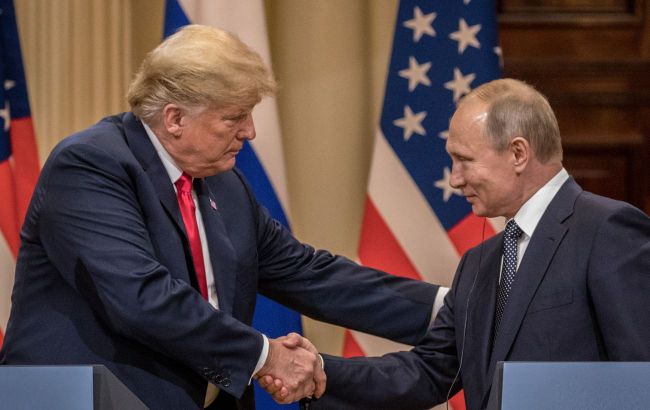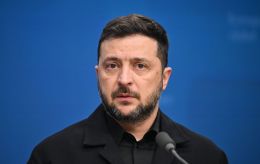Trump pushes back on hellish sanctions against Russia — here's why
 US president Donald Trump and Russian leader Vladimir Putin (photo: Getty Images)
US president Donald Trump and Russian leader Vladimir Putin (photo: Getty Images)
Donald Trump has refused to immediately impose hellish sanctions on Russia. Could his attitude affect Brussels’ plans to ramp up sanctions pressure on Moscow, and is there a possibility the US will start easing sanctions against Russia? Find out in the RBC-Ukraine article.
Key questions:
- Why did the US decide not to tighten sanctions against Russia?
- How will the EU act without US support?
- Could the US ease sanctions against Russia?
- What has Ukraine proposed to enhance the effect of sanctions?
The grand plan of the West to increase sanctions against Russia in case Putin refuses a ceasefire with Ukraine has almost failed. For now, there are no grounds to expect any "crushing" or "hellish" sanctions from the US or EU shortly.
US President Donald Trump has already backed away from his plans to increase pressure on Russia, having seen new opportunities for progress in negotiations following a phone call with Putin on May 19. “I think there's a chance of getting something done. And if you do that (put sanctions - ed.), you can also make it much worse,” the US president said.
What the US planned
Senator Lindsey Graham drafted a bill that, among other things, would introduce 500% tariffs from the US on countries that purchase Russian oil. The bill’s author called the proposed measures “bone-crushing.” Ukraine also considered them quite harsh. Combined with new EU restrictions currently being discussed in Brussels, a new wave of sanctions could have seriously impacted Russia’s economy, believes the head of the Ukrainian President’s Office Andriy Yermak.
However, Trump's call with Putin radically changed the US president's plans. He is now focused on developing trade relations with Russia. “Russia wants to do largescale TRADE with the United States when this catastrophic 'bloodbath' is over, and I agree,” Trump wrote.
What they intend to trade — still unclear
Trump did not specify which areas trade relations with Russia might develop in. Putin also said nothing about Russian proposals — he did not touch upon economic cooperation with the US at all in his commentary following the phone call.
“I believe Putin did not mention it because it’s not a priority for him. Russia basically has nothing to sell to the US,” political expert Taras Zahorodniy told RBC-Ukraine.
He believes that lifting sanctions — primarily from the EU — is the priority for the Russians, as they are interested in the European energy market. “But the problem is that the main beneficiaries of the absence of Russian companies on the European market are actually American companies trading oil and gas there. So, in fact, Trump doesn’t need anyone else on the European market,” Zahorodniy said.
Will the US ease sanctions against Russia?
But if Washington and Moscow do begin working on some sort of trade expansion, then the issue of tightening sanctions — especially economic ones — will lose relevance. Furthermore, in this case, the likelihood of lifting existing sanctions will increase, says a former adviser to the President of Ukraine, Oleh Ustenko.
“There are serious risks that Trump will begin gradually lifting sanctions. Those that were not imposed by Congress and the Senate but were introduced by presidential executive orders. He will try to start with minor but symbolic ones. Then he’ll see what happens and decide whether to move forward with lifting more. So he’ll try to remove them step by step,” Ustenko told RBC-Ukraine.
Will the EU dare to tighten sanctions without the US?
Will the EU decide to strengthen sanctions against Russia, as it intended to do just last week, now after the US refusal? That question remains open.
The US Senate stated its readiness to approve Graham’s bill if Putin does not confirm his desire for peace in the coming days. But the final word still rests with Trump. “That's going to be my determination. That's going to be nobody else’s determination,” the US president said.
Brussels, even before Trump’s pullback from strengthening sanctions, announced the beginning of preparations for the 18th package, which is intended as a serious response to Russia’s refusal of a ceasefire. This package is expected to include restrictions on the Nord Stream pipelines, a lowering of the oil price cap from $60 to $50 per barrel, and additional restrictions in the financial sector. Ukraine is proposing the EU reduce the price cap to $30.
Ukrainian president Volodymyr Zelenskyy has already said that the Kremlin’s most vulnerable points now are oil, energy trade infrastructure, banks, and financial schemes. And these are the areas where restrictions against Russia should be intensified, according to Kyiv.
“Preparations for the next (sanctions - ed.) package are already underway, and it is crucial that it be even stronger. It must include measures targeting the energy and banking sectors, as well as the shadow fleet — not only the vessels themselves but also the crews operating them,” Zelenskyy said.
Brussels remains committed to tightening sanctions as was stated at talks between the leaders of Italy, Germany, France, and Finland with the US president after his call with Putin. “The European participants stated that they would increase pressure on the Russian side through sanctions,” reads a statement from the German government.
Now that the US has stepped back, the EU is unlikely to undertake any truly effective measures that are not supported by the US. Moreover, Trump directly called strengthening sanctions “a bad idea.” Against the backdrop of negotiations to resolve tariff issues, Brussels is unlikely to complicate its relations with Washington.
Although a new EU sanctions package may still be prepared and adopted — the work began on May 20 — the question is how effective it will be. The 17th package turned out to be so weak that it did not even provoke objections from Hungary or Slovakia.
“The EU practically has no effective levers left to pressure Russia. The only effective measure is a complete ban on the import of Russian LNG,” Ustenko said.
But no one in the EU is talking about sanctions on Russian LNG. Meanwhile, Russia is launching a second production line at the Arctic LNG 2 plant, which is under US sanctions.
Sanctions proposals from Ukraine
In addition to LNG, the 18th EU sanctions package could include other restrictions. The Ukrainian side plans to propose its vision of large-scale and effective measures to Brussels in the coming days.
According to the Presidential Commissioner for Sanctions Policy, Vladyslav Vlasiuk, these include the shadow fleet. “It’s time to shift from quantity (number of tankers – ed.) to quality. That is, to sanction brokers, ports, etc.,” he said.
Kyiv has also proposed several categories of technologies and products, restrictions on which would force Russia to reconsider its defense programs.
Specifically, the list includes stricter controls on the supply of carbon fiber and related products (epoxy resins, machines for carbon fiber production), which are used in the manufacture of the casing and nozzle of the Iskander missile’s solid-fuel engine. It also includes a ban on the supply of sodium chlorate and ammonium perchlorate, used to produce fuel for the Iskander-M missile.
Ukraine also proposed to expand the list of raw materials prohibited for export to Russia. For example, titanium ores and concentrates, titanium oxides, titanium slag, antimony ores, ferroalloys, lead ores and oxides, and lead.
But it seems that all these proposals will not be relevant for now. Real sanctions pressure on Russia is unlikely to increase any time soon, even if Moscow does not slow down its military machine. Most likely, over the next few weeks or months, we will see the US preparing some kind of bilateral agreement, not with Ukraine on natural resources, but with Russia on trade.

